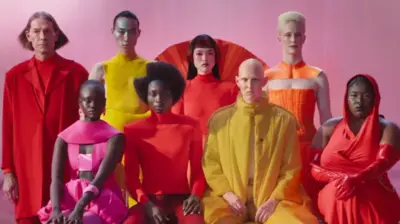We've updated our Privacy and Cookies Policy
We've made some important changes to our Privacy and Cookies Policy and we want you to know what this means for you and your data.
Postcards from another person's reality
- Author, Rachael Buchanan
- Role, ґуПуґ«ГЅ News
"Not in consensual reality". That is how Theresa Kiyota Rahman de Swiet refers to her occasional "altered states of consciousness", her experiences of an alternative take on reality.
What she means by this phrase is that sometimes her reality is not the same, not in a consensus with everybody else's. For Theresa this might manifest itself as a poster coming to life and talking to her as she walks down the street or feeling that her body is disintegrating. Very real experiences to her, but ones that only she is party to.
Theresa's divergent perspective on the world is as a result of a psychotic disorder she has suffered from for some time. Psychosis is a condition that affects a person's mind and can change the way they think, feel and behave.
But Theresa is not so unusual. The Department of Health estimates that one in every 200 people in the UK has experienced psychosis. This may only be one psychotic episode, or can be a lifelong condition, and the commonality is a blurring of reality and imagination.
And these conditions are still very much misunderstood by the public and the media. A <link> <caption>recent poll</caption> <url href="http://www.rethink.org/how_we_can_help/news_and_media/national_press_releases/nine_out_of_ten_pe_1.html" platform="highweb"/> </link> by mental health charity Rethink found that the majority of the public still believe many of the myths about schizophrenia such as having a split personality or being violent.
The reality is that many people with a mental illness, manage their symptoms through medication and lead ordinary lives; like Theresa who works as an <link> <caption>artist</caption> <url href="http://www.analabi.net/Analabi/Analabi.html" platform="highweb"/> </link> .
It is this fear and ignorance that artist Alexa Wright hopes to question in her new photographic project.
`A View From Inside' is an exploration of some alternative perspectives on reality. Her thought provoking portraits offer a window into the unique realities experienced by Theresa and nine other people who have been affected by a psychotic `disorder' such as bipolar or schizophrenia.
Alexa Wright's aim is two fold. "One is bringing issues of mental health into the public domain, she said.
"But the other is to look at our notion of reality. What is reality, we all operate in society on the basis that what we consider real is the same as what someone else might. But it's interesting to look at a reality that only one person is privy to but for them is absolutely real when they are experiencing it."
Alexa Wright has made a career out of examining `difference', and our social attitudes to what is seen as being outside the norm.
Her previous work with people who experience phantom limb syndrome - <link> <caption>After Image</caption> <url href="http://www.alteregoinstallation.co.uk/main_site/afteriimages.html" platform="highweb"/> </link> - powerfully conveyed their physical sensation of a long-lost leg or arm, by digitally re-creating the limb as they feel it now, not as it was before the injury.
"In that project" she said, "I was asking what is the person's real body? The one you and I see, which would end at a stump, or is it the one that person feels and experiences which might incorporate a whole limb? I am looking at the psychological reality; does it mean those limbs are not real just because the rest of us can not see them?"
And 'A View From Inside' is very much a continuation of this theme. In it she has attempted to represent the unique world each of her subjects sometimes inhabit when they are experiencing a psychotic episode.
So her subjects are presented in a very normal way, as they look in everyday life, but the setting around them has been altered to give some clues to the irrational and chaotic reality they have sometimes experienced.
Most of the volunteers were found with the assistance of <link> <caption>Rethink Mental Illness</caption> <url href="http://www.rethink.org/?gclid=CIWnx_7KoK8CFQQMtAodVQ9pcA" platform="highweb"/> </link> . Their Associate Director of Communications , Jane Harris, thinks art projects such as this are an important tool in encouraging the public to re-evaluate their approach to mental health.
"Alexa's photographs stop you in your tracks. They communicate the difference between the everyday reality that we all see and the reality that some individuals might experience".
Adding, "it shows the chaos you can feel when you don't have help but also what might be exciting and intriguing about those symptoms".
The images have been collected together in a book, A View From Inside, and will be publicly exhibited later this year.
Top Stories
More to explore
Most read
Content is not available








